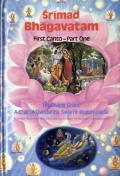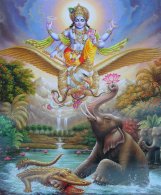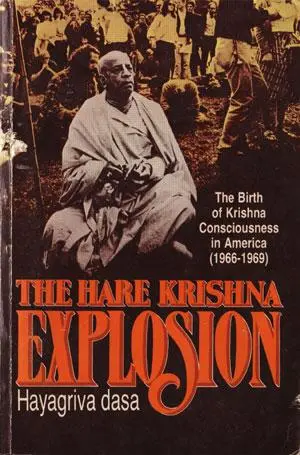This is a nice description of Lord Kṛṣṇa’s transcendental conchshell, and of how He was recieved by the citizens of Dvārakā. Beautiful!
Sūta Gosvāmī said: Upon reaching the border of His most prosperous metropolis, known as the country of the Ānartas [Dvārakā], the Lord sounded His auspicious conchshell, heralding His arrival and apparently pacifying the dejection of the inhabitants.
The white and fat-boweled conchshell, being gripped by the hand of Lord Kṛṣṇa and sounded by Him, appeared to be reddened by the touch of His transcendental lips. It seemed that a white swan was playing in the stems of red lotus flowers.
The citizens of Dvārakā, having heard that sound which threatens fear personified in the material world, began to run towards Him fast, just to have a long desired audience with the Lord, who is the protector of all devotees.
…The sound heralded by Lord Kṛṣṇa was something like the heralding of the sunrise in the morning. This sound of the Lord is identical with the Lord. We are always fearful due to our ignorance of the next problem. The whole material existence is full of problems, and thus the fear problem is always prominent. This is due to our association with the illusory energy of the Lord, known as māyā or external energy, yet all fear is vanished as soon as there is the sound of the Lord, represented by His holy name, as it was sounded by Lord Śrī Caitanya Mahāprabhu in the following sixteen words:
Hare Kṛṣṇa, Hare Kṛṣṇa, Kṛṣṇa Kṛṣṇa, Hare Hare
Hare Rāma, Hare Rāma, Rāma Rāma, Hare Hare
We can take advantage of these sounds and be free from all threatening problems of material existence.
SB 1.11.1-3 Full text and purport
Śrīmad-Bhāgavatam
by His Divine Grace A. C. Bhaktivedanta Swami Prabhupāda
Canto 1, Chapter Eleven, Text 1-3
Lord Kṛṣṇa’s Entrance into Dvārakā
TEXT 1
sūta uvāca
ānartān sa upavrajya
svṛddhāñ jana-padān svakān
dadhmau daravaraṁ teṣāṁ
viṣādaṁ śamayann iva
sūtaḥ uvāca—Sūta Gosvāmī said; ānartān—the country known as Ānartān (Dvārakā); saḥ—He; upavrajya—reaching the border of; svṛddhān—most prosperous; jana-padān—city; svakān—His own; dadhmau—sounded; daravaram—the auspicious conchshell (Pāñcajanya); teṣām—of them; viṣādam—dejection; śamayan—pacifying; iva—seemingly.
TRANSLATION
Sūta Gosvāmī said: Upon reaching the border of His most prosperous metropolis, known as the country of the Ānartas [Dvārakā], the Lord sounded His auspicious conchshell, heralding His arrival and apparently pacifying the dejection of the inhabitants.
PURPORT
The beloved Lord was away from His own prosperous metropolis of Dvārakā for a considerably long period because of the Battle of Kurukṣetra, and thus all the inhabitants were overcome with melancholia due to the separation. When the Lord descends on the earth, His eternal associates also come with Him, just as the entourage of a king accompanies him. Such associates of the Lord are eternally liberated souls, and they cannot bear the separation of the Lord even for a moment because of intense affection for the Lord. Thus the inhabitants of the city of Dvārakā were in a mood of dejection and expected the arrival of the Lord at any moment. So the heralding sound of the auspicious conchshell was very encouraging, and apparently the sound pacified their dejection. They were still more aspirant to see the Lord amongst themselves, and all of them became alert to receive Him in the befitting manner. These are the signs of spontaneous love of Godhead.
TEXT 2
sa uccakāśe dhavalodaro daro
’py urukramasyādharaśoṇa-śoṇimā
dādhmāyamānaḥ kara-kañja-sampuṭe
yathābja-khaṇḍe kala-haṁsa utsvanaḥ
saḥ—that; uccakāśe—became brilliant; dhavala-udaraḥ—white and fat-boweled; daraḥ—conchshell; api—although it is so; urukramasya—of the great adventurer; adharaśoṇa—by the transcendental quality of His lips; śoṇimā—reddened; dādhmāyamānaḥ—being sounded; kara-kañja-sampuṭe—being caught by the grip of the lotus hand; yathā—as it is; abja-khaṇḍe—by the stems of lotus flowers; kala-haṁsaḥ—ducking swan; utsvanaḥ—loudly sounding.
TRANSLATION
The white and fat-boweled conchshell, being gripped by the hand of Lord Kṛṣṇa and sounded by Him, appeared to be reddened by the touch of His transcendental lips. It seemed that a white swan was playing in the stems of red lotus flowers.
PURPORT
The redness of the white conchshell due to the lip-touch of the Lord is a symbol of spiritual significance. The Lord is all spirit, and matter is ignorance of this spiritual existence. Factually there is nothing like matter in spiritual enlightenment, and this spiritual enlightenment takes place at once by the contact of the Supreme Lord Śrī Kṛṣṇa. The Lord is present in every particle of all existence, and He can manifest His presence in anyone. By ardent love and devotional service to the Lord, or in other words by spiritual contact with the Lord, everything becomes spiritually reddened like the conchshell in the grip of the Lord, and the paramahaṁsa, or the supremely intelligent person, plays the part of the ducking swan in the water of spiritual bliss, eternally decorated by the lotus flower of the Lord’s feet.
TEXT 3
tam upaśrutya ninadaṁ
jagad-bhaya-bhayāvaham
pratyudyayuḥ prajāḥ sarvā
bhartṛ-darśana-lālasāḥ
tam—that; upaśrutya—having overheard; ninadam—sound; jagat-bhaya—the fear of material existence; bhaya-āvaham—the threatening principle; prati—towards; udyayuḥ—rapidly proceeded; prajāḥ—the citizens; sarvāḥ—all; bhartṛ—the protector; darśana—audience; lālasāḥ—having so desired.
TRANSLATION
The citizens of Dvārakā, having heard that sound which threatens fear personified in the material world, began to run towards Him fast, just to have a long desired audience with the Lord, who is the protector of all devotees.
PURPORT
As already explained, the citizens of Dvārakā who lived at the time of Lord Kṛṣṇa’s presence there were all liberated souls who descended there along with the Lord as entourage. All were very anxious to have an audience with the Lord, although because of spiritual contact they were never separated from the Lord. Just as the gopīs at Vṛndāvana used to think of Kṛṣṇa while He was away from the village for cowherding engagements, the citizens of Dvārakā were all immersed in thought of the Lord while He was away from Dvārakā to attend the Battle of Kurukṣetra. Some distinguished fiction writer in Bengal concluded that the Kṛṣṇa of Vṛndāvana, that of Mathurā and that of Dvārakā were different personalities. Historically there is no truth in this conclusion. The Kṛṣṇa of Kurukṣetra and the Kṛṣṇa of Dvārakā are one and the same personality.
The citizens of Dvārakā were thus in a state of melancholy due to the Lord’s absence from the transcendental city, as much as we are put in a state of melancholy at night because of the absence of the sun. The sound heralded by Lord Kṛṣṇa was something like the heralding of the sunrise in the morning. So all the citizens of Dvārakā awoke from a state of slumber because of the sunrise of Kṛṣṇa, and they all hastened towards Him just to have an audience. The devotees of the Lord know no one else as protector.
This sound of the Lord is identical with the Lord, as we have tried to explain by the nondual position of the Lord. The material existence of our present status is full of fear. Out of the four problems of material existence, namely the food problem, the shelter problem, the fear problem and the mating problem, the fear problem gives us more trouble than the others. We are always fearful due to our ignorance of the next problem. The whole material existence is full of problems, and thus the fear problem is always prominent. This is due to our association with the illusory energy of the Lord, known as māyā or external energy, yet all fear is vanished as soon as there is the sound of the Lord, represented by His holy name, as it was sounded by Lord Śrī Caitanya Mahāprabhu in the following sixteen words:
Hare Kṛṣṇa, Hare Kṛṣṇa, Kṛṣṇa Kṛṣṇa, Hare Hare
Hare Rāma, Hare Rāma, Rāma Rāma, Hare Hare
We can take advantage of these sounds and be free from all threatening problems of material existence.















Apr 02, 2013 @ 14:14:51
Jai Sri Krishna